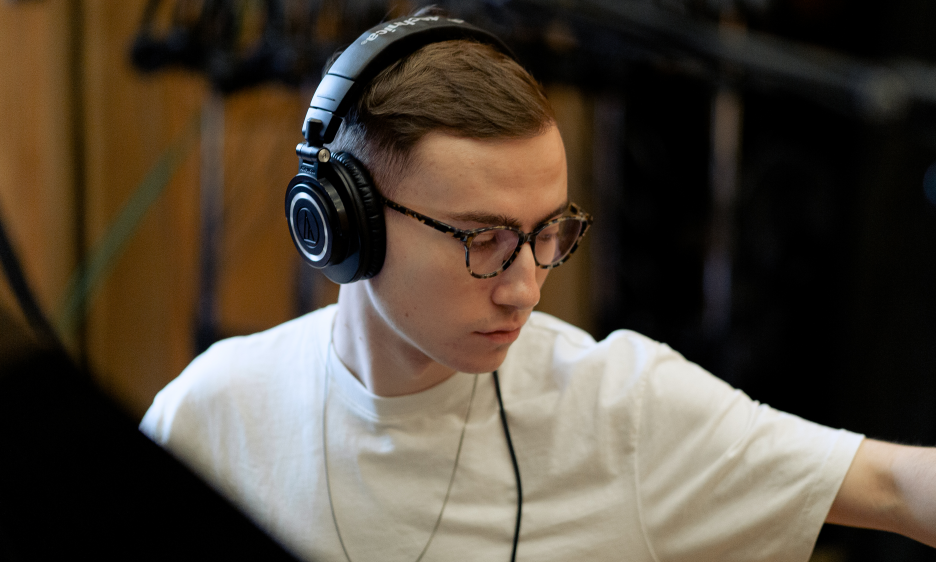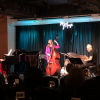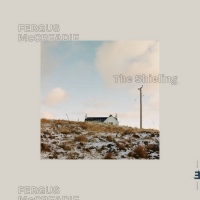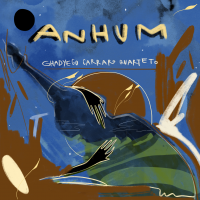Home » Jazz Articles » Interview » Anton Mikhailov: Raising the Stakes
Anton Mikhailov: Raising the Stakes

Courtesy Yulia Bohan
I plan to formulate one of my future releases around my experiences of war, refugees, destinies, discussions, the theme of home, and the search for that home around the world.
—Anton Mikhailov
Today Yesterday
All About Jazz: You describe the project as a "compositional journey—written across several transformative years—to explore what happens when classical training, jazz improvisation, electronic atmospheres, and personal history collide in a single sonic narrative." It does indeed have a narrative flow, beginning with the title cut, "Today Yesterday," which you composed during your move from Murmansk to Moscow. Tell us more about the move, the piece, and how you managed to write during the pandemic—such a chaotic time.To begin with, the shifting meters are intriguing. Roughly, as I would describe it, the opening is in a sort of pressing 7-beat meter until time (and tune) suddenly suspend for the briefest interlude—just atmospheric electronics for a couple seconds. Drums settle into a loping 4-beat meter with a triple subdivision after that. Electronic keys reappear for a moment during the bass solo. During the piano solo, the underlying threes transmogrify into straight eighth-notes—a kind of rock feel with an edgy jazz energy and a backbeat. The nonchalant skipping 4-beat thing comes back near the end, but we never get the initial 7 back, which makes the out-head and in-head feel very different rhythmically. What's going on with all this and how does it fit into the narrative of your move?
Anton Mikhailov: Moving during the pandemic was a strange and difficult choice, though in hindsight, perhaps inevitable. It seems that at this age, moving is still a stressful event, even considering that this was not my first big move. At the time, I was finishing college and needed to write a couple of original compositions to play at auditions for some music academies in Moscow, as I thought this would give me an advantage over performing someone else's compositions at the entrance exams.
In fact, "Today Yesterday" became one of my first jazz compositions that took on a more arranged and finished form than many of the sketches and improvisations that had been performed in bands before but had not been recorded on paper or in sound. It is one of my few compositions before I started working in film music that was written at the same time as the title was conceived, rather than named afterwards, as a result of analyzing the events or emotions that influenced me while writing the music. Yes, the title characterizes the expectation of big changes—a feeling of 'I am on the verge of significant changes in my life, both professionally and personally, they will happen any day now'—and it is exciting. Of course, I did not know what awaited me in Moscow, whether I would succeed there or whether I would have to return or move on somewhere else. Many of the tasks I faced were new to me!
The rush and slight pulsation at the beginning seem to reflect the panic and haste that I was largely enveloped in while preparing for the move and preparing for auditions, but fortunately not in writing music! The dynamic lulls in (bassist) Ivan Lipatov's and my solos can be interpreted by me as 'moments of calm' when you can allow yourself to enjoy a free evening and take a walk somewhere in nature late at night in the absolute light of the polar day in Murmansk. But some of the rhythmic unisons here also awaken the listener, just as they did me when I received new challenges and calls to action during those months.
Judging by the feedback I'm getting about the album, such a bright beginning appeals to many and seems to be in the spirit of the times! But in terms of meaning, it's all logical too—I haven't returned to the feeling of haste and panic for a long time, simply because it has become my everyday life and routine, like that of most residents of a large metropolis! You get used to a busy work schedule, thousands of people around you in public spaces, and daily encounters.
Thoughts
AAJ: The three introspective solo "Thoughts" pieces, which you recorded at home, sound as though the piano has been prepared in some way. The timbre is percussive yet very gentle. What kind of sound were you looking for, and what did you do to create it? And how do these interludes fit into your "compositional journey?"AM: In fact, it is the well-known felt on the middle pedal of an upright piano, but the peculiarity is that it is an antique instrument from the 1910s that I found and bought here in Tbilisi, as it turned out to be a cheap and interesting solution for conducting classes with students.
Ever since my college days, I have been interested in tuning and repairing pianos, so keeping such an antique instrument with an old and not particularly familiar mechanism in good working order was an interesting task and hobby for me. It was a C. M. Schröder that somehow ended up in Georgia. Its special mechanism, which has long been out of use in modern instruments, as well as the wear and tear of some elements, combined with the felt, resulted in a sound quite close to Ilya Mazaev's recording of this instrument, as well as the rather "expressive" room in my apartment on Avlabari and a small pinch of post-production with artistic effects.
The idea was to have small improvisational interludes that allow you to 'breathe' between full-fledged compositions in the band and, of course, to think and reflect. These are logical 'swings' characteristic of our lives and music, in this case, dips in activity for experiences.
Fuel for Each Other
AAJ: Your titles are quite evocative. And since you have said that the aim of the project is to tell the story of your journey, can you tell us how some of the pieces fit into that story? What does "Simple"—the second track—represent to you? To begin again from a metric standpoint, the subdivision is noticeably finer than it was on "Today Yesterday." Each beat is divided into four 16th-notes, which creates a feeling of forward momentum with an excitedly fast internal pulse. What, if anything, were you trying to portray? "Bitterly" and "Rush" also have evocative titles, and each has a particular ethos. Briefly, what—if anything—were you rushing into, and what embittered you?AM: As for the composition "Simple" it's quite simple—from the point of view of when it was written, it's just a time of getting used to a new place, a new country, the absence of old connections. Such events in life turned out to be somewhat simple for me, as they repeat themselves over and over again—it seems I can never sit still. For me, this pulsation, this mood expressed by this harmony, is ordinary and neutral, everyday. It seems that I am not the most positive and optimistic person—perhaps this can be judged by what 'simplicity' means to me! As for the dynamic development in this composition up to a certain maximum, this is due to the interaction between us within the trio; we constantly encounter this—provoking each other, we are a kind of fuel for each other at concerts and recordings.
"Bitterly," as the title suggests, and as you have noted, is about feelings of bitterness and longing. It is a period of loneliness that many people who were forced to leave their homes at that time probably experienced. Of course, after the initial period, you stop worrying about everyday things and realize that what was important and valuable to you were the loved ones you left behind. It is a feeling that is understandable and familiar to everyone, but brought to the extreme due to the circumstances of not being able to return to your loved ones. The composition ends with a hysterical outburst, illustrated by Roman Reznik's drum solo.
"Rush," in short, is about striving for something greater, about ambition, about raising the stakes. Even after moving to a smaller country, I've kept that drive—maybe it's my age, maybe my nature. I hope it keeps resonating in my music.
Danseuses de Delphes
AAJ: Your arrangement of Claude Debussy's "Danseuses de Delphes" seems to be the only non-original on the date. You mention that Reznik suggested the piece. The feel you and your bandmates create is wholly different from the delicate and mysterious way in which, say, Daniel Barenboim renders the prelude. Your dancers have a lot more heft and humor to them. Maybe they are closer to the giant stone statues that inspired Debussy to write the prelude? But it is also easy to imagine a dance class in parts of your arrangement. In your classical days, did you ever accompany dancers?AM: Our version of "Danseuses de Delphes" seems mysterious and still unknown to me, even though we played it ourselves. Impressionism is an important direction for me, and I saw in it enormous potential for performance in a jazz trio, as did many contemporary jazz composers. This is an interpretation of the musical canvas, but not an interpretation of the meanings Debussy may have put into it—it is our view of this music, of how we and I personally felt it. This is something I did often while studying for a while in the academic piano department at college—interpretations of Slonimsky, Scriabin, Kapustin. I'm sure many improvising pianists do this in between studying compositions.
Yes, and it's funny that I worked for several years as an accompanist in various dance groups, performing classical warm-up exercises on the piano. Of course, some of these compositions were improvisational or based on dance numbers by Tchaikovsky, Glinka, and so on.
A Better Future
AAJ: Our readers will be interested to know how you fared in the move from Murmansk to Moscow. How did that work out for you?AM: For me, it seems like a long time ago, since I left Russia in 2022. Nevertheless, the move turned out to be interesting, albeit exciting. I managed to work on a river cruise ship throughout central Russia, work in various music schools as an accompanist and teacher, play my first concerts, and meet dozens of talented and interesting musicians. Unfortunately, I never managed to capture this period with a studio recording with those very musicians, but that's in the past! I hope the people and culture there will find a better future.
AAJ: To conclude with one final question, what are you working on now and what is on the horizon for you?
AM: Right now, I'm actively working on music for TV series and films, as well as new original jazz music, of course. I plan to invite Georgian colleagues with whom I played so much when I first moved to Georgia, as well as to formulate one of my future releases around my experiences of war, refugees, destinies, discussions, the theme of home, and the search for that home around the world.
I also plan to collaborate with European colleagues, search for new sounds, and reveal my own potential as a sound producer by interacting with listeners through a more electronic sound, as well as performing in Europe and the Middle East.
AAJ: Best of luck with everything. We look forward to hearing more from you.
Tags
Interview
Anton Mikhailov
Katchie Cartwright
Georgia
Tbilisi
Today Yesterday
Roman Reznik
Ivan Lipatov
PREVIOUS / NEXT
Support All About Jazz
 All About Jazz has been a pillar of jazz since 1995, championing it as an art form and, more importantly, supporting the musicians who make it. Our enduring commitment has made "AAJ" one of the most culturally important websites of its kind, read by hundreds of thousands of fans, musicians and industry figures every month.
All About Jazz has been a pillar of jazz since 1995, championing it as an art form and, more importantly, supporting the musicians who make it. Our enduring commitment has made "AAJ" one of the most culturally important websites of its kind, read by hundreds of thousands of fans, musicians and industry figures every month.


























